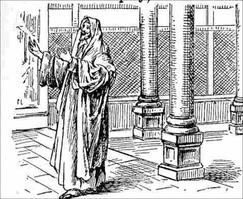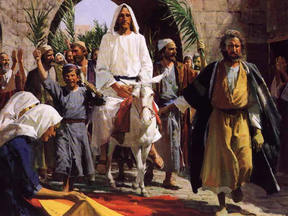 Image: Wikipedia Creative Commons
Image: Wikipedia Creative Commons  Image: Flickr/Freestone Wilson
Image: Flickr/Freestone Wilson |
Life for the Jews in first century Palestine was pretty tough, in fact it had never been easy! They had been conquered by the Romans in 63 BC by Pompey; but this was only the last in a line of foreign rulers including the Greeks, the Assyrians, Babylonians and Egyptians. The problem for Israel is that it lies at a very important crossroads between the Mediterranean, Africa, the Arabian Peninsula and the Far East. Spices, silks and food-stuff were constantly being traded across its borders and this made it a profitable and well as strategically important land to hold. It is no wonder that by 30AD the people of Israel had begun to rather fed up of all this foreign rule and yearned for the golden age of David and Solomon, the great kings of Israel to return. Into this cauldron came a man, called Jesus of Nazareth, who was soon being hailed by some to be The Messiah, the redeemer of Israel. I do not want to get into a debate here about who Jesus really was. The options are various and have been hotly contested over the centuries: from God incarnate, to liberal Rabbi and from political dissident to strict Jewish reformer. The “quest for the historical Jesus” has long generated a great deal of heat and not much light. One thing that cannot be disputed is that the different Jewish groups who lived in Palestine at the time of Jesus certainly had different ideas about whether a Messiah was going to come and if he did, what sort of a leader he was going to be. The Sadducee: The Sadducee were the upper class who held power in the temple and held the majority of seats on the council of elders at Jerusalem (the Sanhedrin). They often tried to work with the Romans to ensure peace. Religiously, they believed that the Torah (the first five books of the bible) was the only part of Judaism with any authority - they therefore did not believe in the Messiah asthe he was not predicted in the Torah.  Image: Wikipedia Creative Commons Image: Wikipedia Creative Commons The Pharisees: This group were middle class Jews who were mainly businessmen and they dominated the Synagogues, the small meeting places of ordinary Jews throughout the country. They did take the rest of the Jewish Bible (the Tanakh) seriously and so were expecting a Messiah, but they took the Law so seriously that they were obsessed by it and following it closely. Laws about cleanliness, food and professions were taken extremely seriously and so they come across as uncompassionate in the New Testament. The Messiah for them would be a prophet like Moses, a Priest and a King like David. He certainly would not be “the son of God” and they did not believe that God could become man. The Essenes: The Essenes were a small sect of Judaism that were very like the Pharisees with a few key differences: They were extremely secretive and they were expecting an imminent catastrophe that would end the world and they believed the Messiah would usher in this end time. They seem to have not accepted Jesus as Messiah, although there are some scholars who think that John the Baptist might have been an Essene. The Zealots: These were a group of political dissidents who wanted to rebel against Roman rule - they would have looked for a Messiah who was a political leader. It is interesting to note that amongst Jesus’ disciples was a man called “Simon the Zealot”. In fact they did eventually cause a revolt in 66 AD after Jesus’ death which eventually led to the Jewish expulsion from Palestine in 70AD and the destruction of the Temple.  Image: Flickr/Freestone Wilson Image: Flickr/Freestone Wilson In the end Jesus seems to have been rather different to what these final three groups wanted: He was not a military man as he showed when he arrived in Jerusalem on Palm Sunday riding on the colt of a Donkey so the Zealots rejected him. He was not pure enough for the Pharisees as he mixed with Romans, tax-collectors and sinners. And finally he did not bring about the end of the world as the Essenes wanted. Perhaps it was this, added to the fact that the Sadducees did not believe in a Messiah at all that lead to him being arrested and handed over for crucifixion. Of course for Christians today this is not an issue, as we saw last week it was all part of God’s plan for salvation that Jesus would be despised and rejected to unite God and Humans. Comments are closed.
|
Archives
June 2016
Categories
All
|
